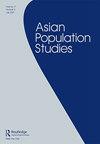Son preference, gender asymmetries and parity progressions: the case of Kyrgyzstan
IF 1.5
4区 社会学
Q2 DEMOGRAPHY
引用次数: 0
Abstract
ABSTRACT The paper considers son preference effects оn actual fertility behaviour in Kyrgyzstan, a post-Soviet country of Central Asia. Using data from the DHS2012 and DHS1997, I argue that risks of transitions to parities from the second to the fifth are significantly higher among women with no sons. Furthermore, the relation of risks of parity progressions to sex composition of children already born is not generally stronger in families with strict gender asymmetries. Attempting to explain this, I show that in such families, contraceptive use is less frequent – and that could complicate the implementation of son preference in such families and weaken their expected contrast with other families in the role of son preference for fertility outcomes. The possibility also is discussed that son preference may be supported by factors not related to family-internal norms, such as the need for all families to have a male heir for securing family wealth.重男轻女、性别不对称和平等进步:以吉尔吉斯斯坦为例
本文考虑了儿子偏好对吉尔吉斯斯坦实际生育行为的影响,吉尔吉斯斯坦是中亚后苏联国家。根据2012年和1997年人口和健康调查的数据,我认为,没有儿子的妇女从第二胎过渡到第五胎的风险明显更高。此外,在性别严重不对称的家庭中,性别平等进展的风险与已出生儿童性别构成的关系通常并不强。为了解释这一点,我表明,在这样的家庭中,避孕药具的使用频率较低——这可能会使这些家庭重男轻女的实施复杂化,并削弱他们与其他家庭在重男轻女对生育结果的作用方面的预期对比。还讨论了一种可能性,即重男轻女可能受到与家庭内部规范无关的因素的支持,例如所有家庭都需要有一个男性继承人以确保家庭财富。
本文章由计算机程序翻译,如有差异,请以英文原文为准。
求助全文
约1分钟内获得全文
求助全文
来源期刊

Asian Population Studies
DEMOGRAPHY-
CiteScore
3.30
自引率
14.30%
发文量
12
期刊介绍:
The first international population journal to focus exclusively on population issues in Asia, Asian Population Studies publishes original research on matters related to population in this large, complex and rapidly changing region, and welcomes substantive empirical analyses, theoretical works, applied research, and contributions to methodology.
 求助内容:
求助内容: 应助结果提醒方式:
应助结果提醒方式:


